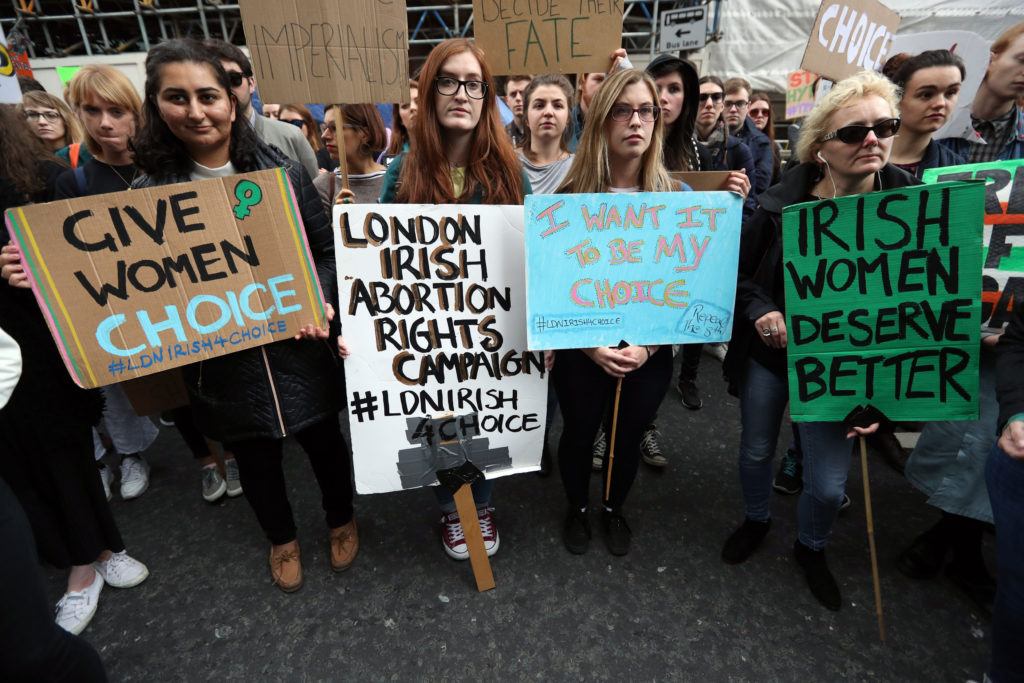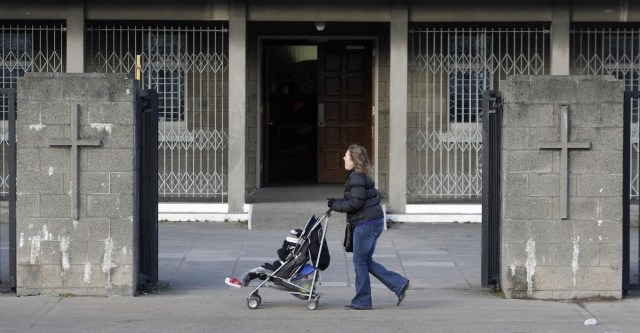Niall Carson/PA Archive/PA Images

On Saturday, pro-choice activists took to the streets of Dublin to campaign to ‘Repeal the Eighth’ – that is, the Eighth Amendment to the Irish constitution which extends the same right to life to the unborn child as to the mother. They want to extend to Ireland much the same abortion provision as is available in mainland Britain. The fit, the fun and the angry were out in force – 30,000 of them, by their own estimation – with slogans like, “Keep your filthy laws off my silky drawers” and “Women are Furious”. The usual.
The demonstration was led by Abortion Rights Campaign member Angela Coraccio, who said the Eighth Amendment is “an instrument of torture” and described the country’s current abortion law as “barbaric”. That gives you a pretty good flavour of the rhetoric that characterises this campaign.
The Eighth Amendment to the Irish constitution was introduced in 1983 by the then PM, Garret Fitzgerald, to ensure that Ireland would give equal constitutional protection to the foetus as to the mother. Interestingly, he was from the same party as Leo Varadker, the present Taoiseach, or premier, who describes himself as pro-life but has held off from taking sides on the referendum he has called for May or June next year, just before the Pope’s planned visit to Ireland.
Back in 1983 the debate was over whether the amendment went far enough – Dana, Ireland’s former Eurovision song contest winner, led a campaign for even greater protection for the embryo/foetus. This time it’s focused on the question of whether the foetus does indeed have human rights comparable with his or her mother’s.
There has been a consultative commission to advise the Government on what might follow the repeal of the Amendment, but it was so weighted towards pro-choicers as to threaten to be a hindrance to any bid to repeal it. Essentially, its probable recommendation for the referendum is for Irish law to replicate British law in respect of abortion, but this is less likely to gain popular support from the electorate as a bid to ban abortion in extreme circumstances, for instance, after rape.
An interesting facet of the current debate is what’s absent from it. That is, the Catholic Church. The succession of child abuse scandals has largely discredited the church as a player in national politics. The most recent referendum which approved gay marriage was significant for the fact that the bishops were largely absent from public debate. The church is so traumatised by the aftershock of abuse scandals, it has effectively acknowledged that its intervention in issues like abortion could do more harm than good.
So the onus is on lay and secular groups to articulate the case against abortion. And impressively, they have reclaimed the issue as primarily a moral issue rather than a religious one. The argument is being conducted in Ireland on the pro-life side on whether a foetus really is a human being and deserving of the protection of the law, rather than on the theological question of when a foetus is ensouled. So, although most of the anti-abortion campaigners are themselves Catholic, this campaign is being fought out on non-religious territory, as to whether pre-natal human life deserves protection.
For anyone accustomed to the circumlocutions of the abortion lobby in Britain, the outspokenness of the pro-life lobby is extraordinary: their meetings and pamplets include testimonies from people born as a result of rape or the parents of children who were diagnosed, prenatally as deserving termination, but who have since been born to delight their families. The argument is that there are thousands of people alive in Ireland as a result of its restrictive abortion laws.
The obvious argument on the other side is that this is a problem that is effectively subcontracted to a neighbouring state: Britain; last year 3,265 women who had abortions in Britain gave addresses in the Republic.

Social media is the weapon of pro-choicers and it has had the usual toxic effect. Three hotels, including the well-known Aisling, refused to host pro life rallies, because they had become the target of pro-choice threats. I saw the effect of that targeting first hand, myself, when I spoke at an anti-abortion rally over a year ago and saw the stage occupied by three pro-abortion activists.
There’s a subsidiary debate about funding. Pro-repeal groups say that US groups fund the anti-abortionists but funding is an even more fraught issue for the pro-choice lobby – the George Soros Foundation, for instance, provided three pro abortion groups in Ireland, including Amnesty International’s Irish branch, with some $400,000. The UN has thrown what weight it has behind the Repeal campaign.
We shall see how this plays out. The campaign to extend abortion to the Republic may seem similar to the campaign for gay marriage, but it is not: it’s far uglier. The same groups that backed the previous campaign are backing Repeal but in this case, both sides of the debate are arguing about human rights. And if the pro-life lobby wins, it will be a victory for the principle that abortion is not a religious issue but a human rights issue – for the foetus.
UPDATE: “One pro-choice group (the Abortion Rights Campaign) had to hand back $25,000 from the Soros Foundation because under Irish law you cannot receive money from abroad for political purposes. ARC could not persuade the authorities that their donation was not for a political purpose whereas Amnesty Ireland and the Irish Family Planning Association did.”









Join the discussion
Join like minded readers that support our journalism by becoming a paid subscriber
To join the discussion in the comments, become a paid subscriber.
Join like minded readers that support our journalism, read unlimited articles and enjoy other subscriber-only benefits.
Subscribe